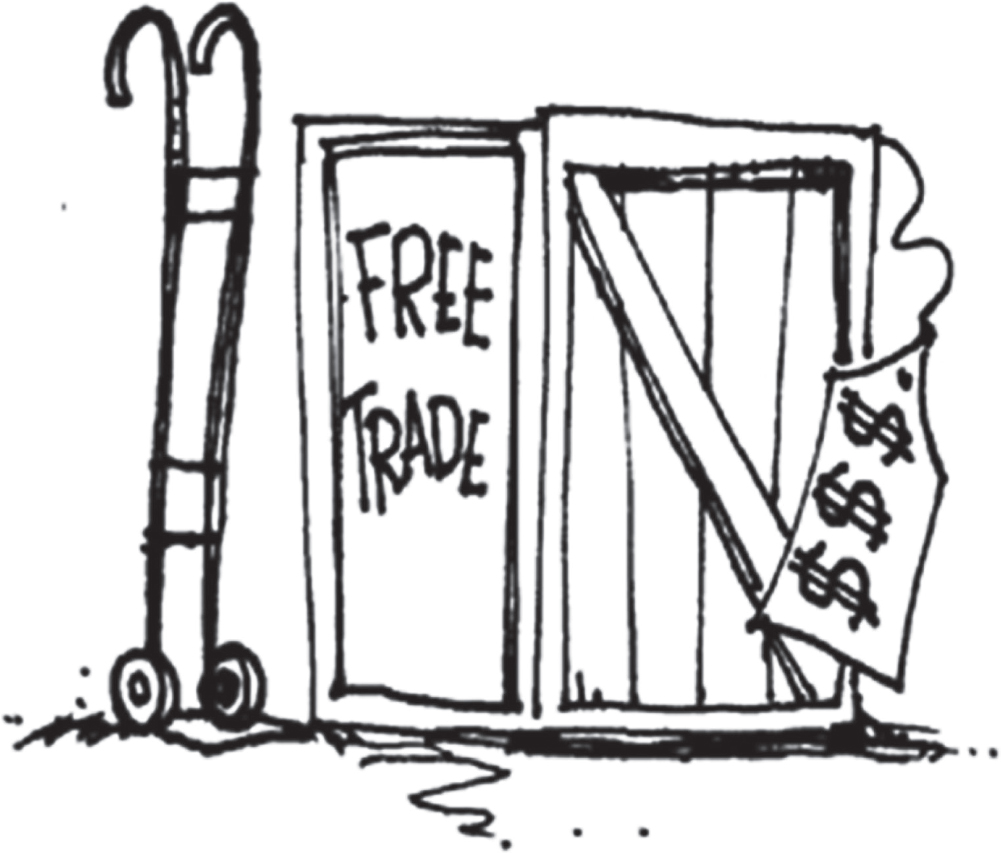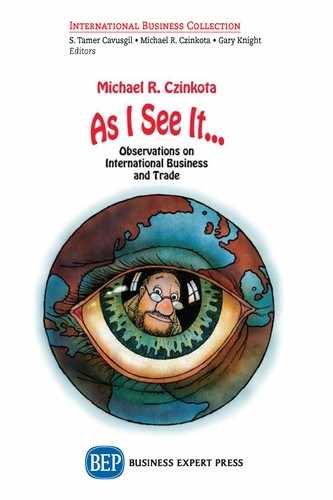The Cost and Obstacles for Freedom
Congressional Record US House Representatives, May 2005

The cost of freedom is rising. Terms like free trade or free choice are misleading since they all come with a price, which international marketers pay in terms of preparing their shipments, scrutinizing their customers, and conforming to government regulations. We all are paying a higher price due to global terrorism.
As freedom suffers, so does international marketing. In most instances, terrorism is not an outgrowth of choice but rather the lack of it. Terrorists may succeed in reducing the freedom of others but not in increasing their own. Who is typically most affected by terrorist acts? Attacks aimed at businesses, such as the infamous bombings of U.S. franchises abroad, do not bring big corporations to their knees. The local participants, the local employees, the local investors, and the local customers are affected most.
Who can protect themselves against such attacks and who can afford to protect targets? Only the wealthier countries and companies can. They have the choice of where to place their funds, with whom to trade, and whether to hold the enemy at bay through a security bubble created by changing business formats via exporting or franchising. The poor players do not have choices. The local firms, the nations with developing economies, and the poor customers continue to remain exposed to further acts of terrorism with very limited indigenous ability to influence events.
But international marketing can enable the disenfranchised to develop alternatives. Multinational firms can invest in the world’s poorest markets and increase their own revenue while reducing poverty. With support from shareholders and the benefit of good governance, international marketers can, and should, continue in their role as social change agents. The discipline has value maximization at its heart. If it is worthwhile to fulfill the needs of large segments of people, even at low margins, then it will be done. International marketers after all have as their key desire the creation of new customers, suppliers, and markets. They are delighted when, in fulfillment of their aims, they can bring about freedom from extremes of hunger, sickness, and intolerance.
In a global setting, freedom can take on many dimensions. Privileges and obligations that are near and dear to some may well be cheap and easily disposed of by others. The views of one society may differ from views held in other regions of the world. Such differences can account for misunderstandings, surprises, and long-term conflicts. There are two value dimensions at work here, both of them highly relevant to international marketing. One may be circumscribed as the freedom and values of a market economy. To make them work, governmental, managerial, and corporate virtue, vision, and veracity are required. Until the world can believe in what institutions and their leaders say and do, it will be difficult to forge a global commitment between those doing the marketing and the ones being marketed to.
It is therefore of vital interest to the proponents of freedom and international marketing to ensure that corruption, bribery, lack of transparency, and poor governance are exposed for their negative effects in any setting or society. The main remedy will be the collaboration of the global policy community in agreeing on what constitutes transgressions and on swift punishment of the culprits involved, so that market forces can work free from distortion.
A second and even more crucial issue is the value system we use in making choices. Some years ago, the Mars Climate Orbiter mission failed spectacularly as a result of the use of different values by the mission navigation teams. One team was using metric units and the other used the English system of measurement. This mistake caused the orbiter to get too close to the atmosphere, where it was destroyed.
There are major differences among what people value around the world. Contrasts include togetherness next to individuality, cooperation next to competition, modesty next to assertiveness, and self-effacement next to self-actualization. Often, global differences in value systems keep us apart and result in spectacularly destructive differences. How we value a life, for example, can be crucial in terms of how we treat individuals. What value we place on family, work, leisure time, or progress has a substantial effect on how we see and measure each other.
Cultural studies tell us that there are major differences between and even within nations. International marketing, through its linkages via goods, services, ideas, and communications, can achieve important assimilations of value systems. On the consumer side, new products offer international appeal and encourage similar activities around the world: many of us wear denim, dance the same dances, and eat pizza and sushi. It has been claimed that local product offerings help define people and provide identity. Johansson states that is the local idiosyncrasies that make people beautiful. Some even offer the persistence of the specific breakfast habits of the English and the French as evidence of local immutability in the face of globalization. Yet, we should remember that values are learned, not genetically implanted. As life’s experiences grow more international and more similar, so do values. Therefore, every time international marketing forges a new linkage in thinking, new progress is made in shaping a greater global commonality in values. International marketing’s ability to align global values which makes it easier for countries, companies, and individuals to build bridges between them, may eventually become the field’s greatest gift to the world.
How do freedom and international marketing match with today’s discontent so forcefully expressed by the disgruntlement of the anti-globalists? Many claim that never before in history has there been so much evidence about such strong opposition to globalization and to Americans as harbingers of international marketing. Perhaps those making such claims are sadly mistaken. In looking at other “globalizers” in world history, such as the Vikings, the Mongols, the Tatars, and the Romans, there probably was both intellectual and physical opposition (or do we really believe that everybody enjoyed Genghis Khan?). But protest was never allowed to become very vocal, or to engage in repeated, large demonstrations or widespread pamphleteering. Due to rather harsh policies of dealing with the opposition, very few records of such resistance are available today. Consequently, comparisons with past events are difficult to make and are likely to be highly inaccurate.
Today’s news is good. The nations, institutions, and individuals around the world are increasingly accepting freedom as the key foundation of the good life. We are discovering that international marketing, both as a discipline and as an activity, is very closely interwoven with freedom—some even call it essential. It is the freedom Thomas Aquinas saw as the means to human excellence and happiness, which international marketing helps us reach. In reciprocal causality, freedom causes and facilitates international marketing, while international marketing is a key support of the cause of freedom. A productive symbiosis at work!
